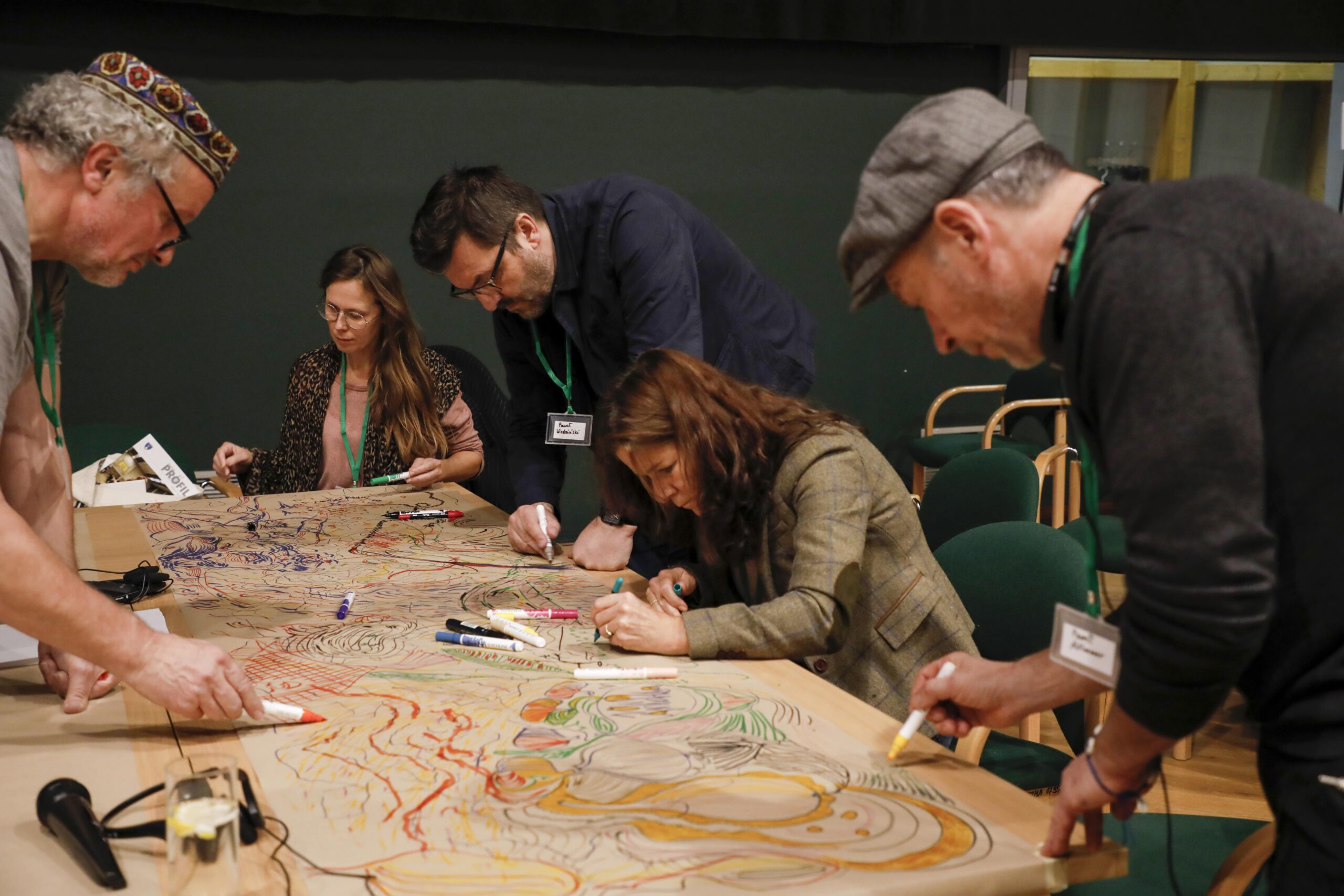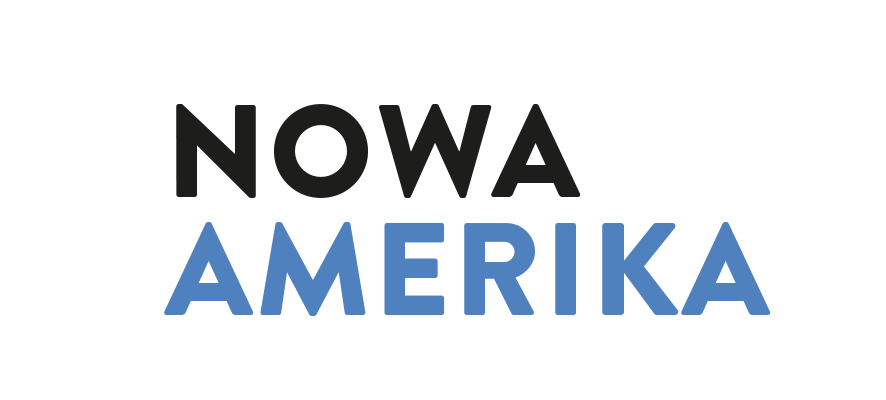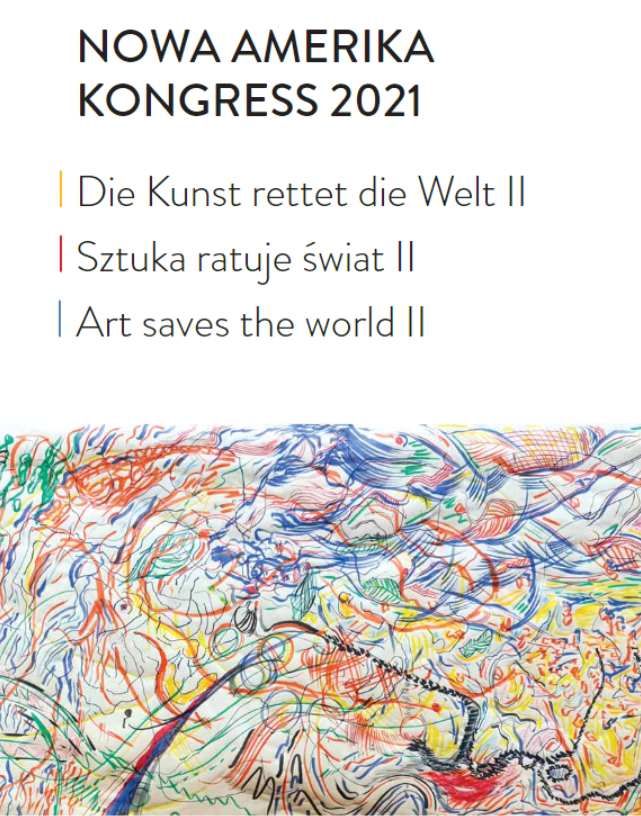Art saves the world II
Nowa Amerika – Congress 2021
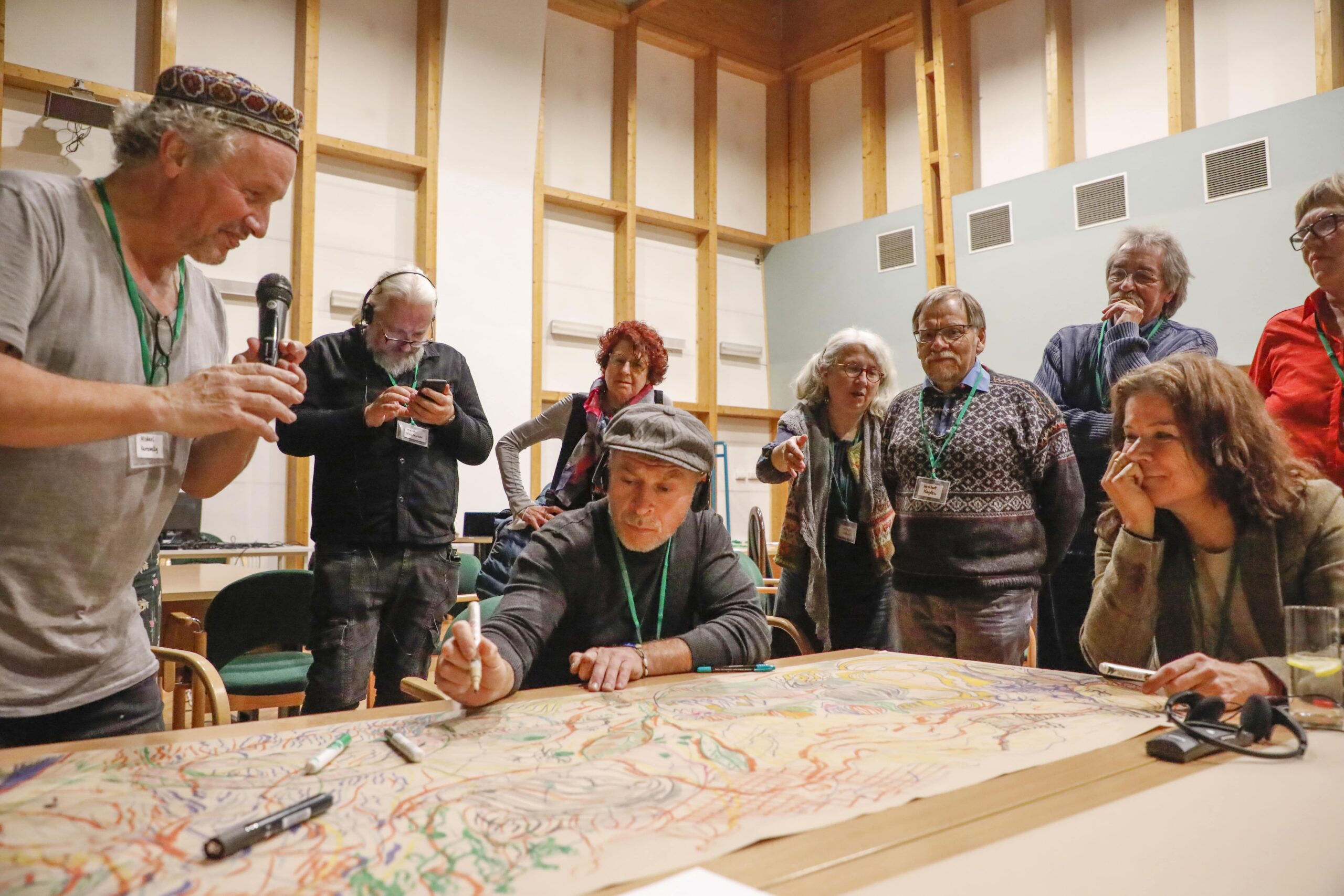
Our challenge for the planet is to transform longing into action. The path leads from utopia to heterotopia. Society becomes a laboratory where the future is tried out and failure is allowed.
Nowa Amerika is a backbone amoeba formed by the two rivers Odera and Nyße. Nowa Amerika is a federation composed of Szczettinstan, Terra Incognita, Lebus Ziemia and Schlonsk. This new space in between expands towards the East Pole and the West Pole and the size of the space is determined by the origin of the players. The capital is Słubfurt, the metropolis New Szczettin. The highest body of Nowa Amerika is the Nowa Amerika Congress. It takes place once a year. Anyone who feels they are a Nowo-American can attend the Nowa Amerika Kongres. Every Nowo-American who attends the Nowa Amerika Kongres has one vote in the elections. Nowa Amerika is a democratically governed European region. The Nowa Amerika Kongres makes decisions concerning the legal form, organisational structure and governance of the network. The bodies elected at the Nowa Amerika Kongres serve the development of Nowa Amerika and the coordination of the network. Above all, however, the Congress is a platform for the exchange of information and ideas. Projects are generated and working groups on project plans, topics and ideas can be formed at any time – even outside the Congress. At this year’s Nowa Amerika Congress we want to discuss the necessary changes in our social structures in the face of climate change, the financial crisis and other global challenges. We will be taking advice from various experts.
Michael Kurzwelly, Karsten Wittke, Joanna Kiliszek
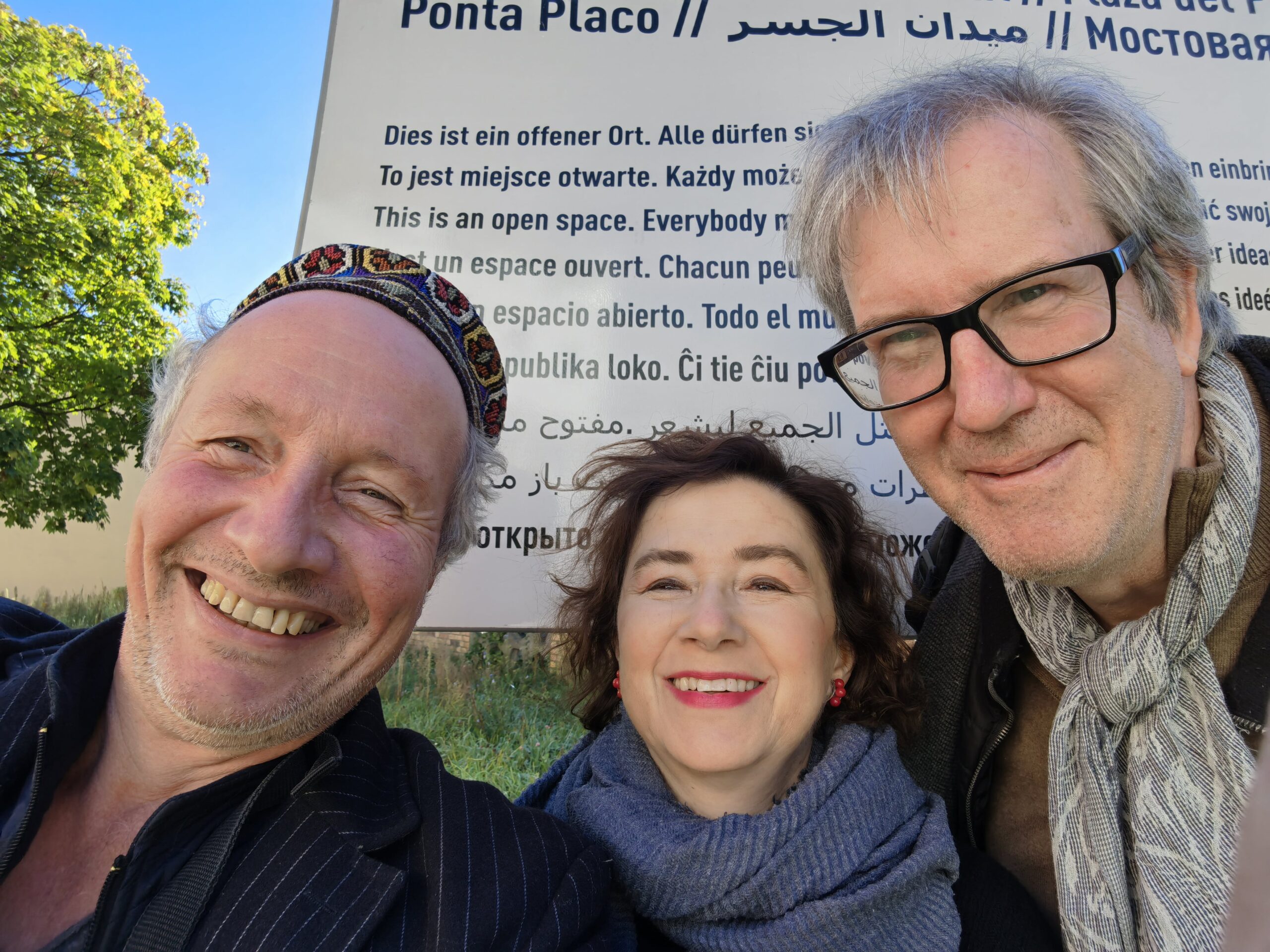
Module I – 29.10.2021
Artist Society:
Michael Kurzwelly
„It is about understanding all individuals as artistic-creative beings who playfully and seriously, humorously and daily rediscover the world, find and make new connections, network with each other in it and become creators of society. The new social system no longer has anything to do with a meritocracy in which work and career are the motor and the yardstick.”
Paweł Althamer
“Thank you for the invitation Michael! Our meeting is the result of a mutually built trust and friendship that was born during artistic games, as if we were Beuys’s children bringing to life what would happen if each of us did what we wanted, what we liked. (…) Today’s topic I would like to dedicate to the Nowolipie Group, in which we have been meeting once a week for 26 years. (…) I was tempted by the possibility of venturing into the unknown. This is an element of courage, which is an important motive for artists, because this courage comes from the feeling of being free, which means I can choose what I like. (…) The essence of what we do is community, or sharing our own ever more beautiful sensitivity to each other and to what we can create. (…) What is my conclusion is a cultivated carefreeness – not to panic and (…) to celebrate our meeting.”
Gerrit Gohlke
„An artistic act opens the mind. I think it is crucial for art to be allowed to become material. That is no disrespect to the republic we are facing – the society, the artists, the scholars’ republic. It’s just the claim that one should always establish with both feet on the ground. In the end, the negotiation process leads into the political sphere, although it involves some difficulties – to speak the language of politics and administration. Just like at this congress, we always need a translator for this. (…) When the Brandenburg Minister of Agriculture said that every village needs a mission statement, he was right.”
Marek Wasilewski
„I want to tell you what we do in the ‘town’ of Poznan. The Arsenal City Gallery is a municipal gallery, a self-government cultural institution. (…) It is very important from the point of view of the programme assumptions of such a place. It is an institution which plays a certain role in the context of the self-governance of the city’s inhabitants, it is an element of a network of connections with other cultural and social institutions and with an extremely developed movement of non-governmental organisations. We are a piece of a puzzle. The exhibitions, participatory projects, meetings and workshops we prepare together with the public seek a formula that turns the audience into active participants, co-creating the course of events.”
Module II – 30.10.2021
Sustainable development and aesthetics
Karsten Wittke
„As coordinator of municipal development policy for the city of Baruth/Mark, the 17 Sustainable Development Goals (SDGs) and the responsibility to act in a globally sustainable manner in accordance with the Agenda 2030 are my daily bread and work assignment. There are just under 8 years left to steer the course into the apocalypse or dystopia that is becoming ever more apparent, so that our children and grandchildren can continue to live or survive on this limited SHIP EARTH. Every day I try to make a small contribution to the difficult rudder manoeuvre. But this is not as a visual artist, but in the function of an employee in a municipality in the rural area of Brandenburg. The fly in the ointment: unfortunately, in the discussion and activities of the task areas of climate crisis, clean water, health, energy and education, there has been no room for art and culture as a connecting medium of knowledge that positions itself beyond official and economic necessities. Does “art” simply no longer have a relevant statement or position on existential questions and challenges in Western or, more broadly, global society? The pandemic has only strengthened this impression for me, for how unimportant the “core task” of creative, artistic work seemed and seemed in the discussion about systemic relevance in the arts. For me, art seems marginalised and deprived of the task of a content, be it spiritual, enlightening or meaningful “salvation”. In times of crisis, isn’t it precisely art that provides a free space for energy, courage, criticism and respect, calm, reflection and contemplation for local/global people as an offer to “save the world”?”
Aleksandra Jach
„I am convinced that despite many unfavourable forces in the field of cultural institutions in Poland, there is still room for change towards green transformation. I think of the amazing people who have been working in these places for years, with great knowledge and competences, who want to and will develop in the field of ecology.”
Claudia Büttner
„Art can be sustainable and lasting if it changes our everyday life and the environment aesthetically or directs our gaze to something new and fascinates. For this, art must on the one hand be specifically conceived for a place, create more than just formal connections, deal with people and their use, their interest and needs; and on the other hand make offers to people for the active appropriation of a place, through communication structures, themes taken up or new narratives.”
Anja Oswald
„Art has to get out of its traditional territories of self-referential self-assurance. Art has to go back out onto the streets, to the people. It must get involved. In times of climate change and other (global) ecological, social and political catastrophes, art is at best a “disruptive factor” that throws sand into the gears of cherished patterns of thought and action. In this sense, “dissonance production” (Christine Würmell) is a central aesthetic criterion.”
Module III – 30.10.2021
Local, global, international
Joanna Kiliszek
„The practice of art throws us out of our habits of thought, provokes us to reject notions that we have hitherto taken for granted, and opens our minds. To others and otherness. In this context, I would like to refer to three notions: hospitality, impotence and reflective practice. Nowadays, Kant’s thought about the peaceful coexistence of humanity, about the coming “Weltbuergerrecht” and global hospitality is most relevant. Contemporary civilisational challenges such as globalisation, widening social inequalities, consumerism, the destruction of nature, climate change, wars, an ageing population, the automation of work, mass migrations, neo-liberalism, neo-conservatism and populism, the need to regulate digital platforms, and the consequent rejection of universal values and a sense of community, the avoidance of responsibility for the future and pandemics create a feeling of powerlessness. Transforming this feeling into strength can be done through the method of reflective practice, which means constant and critical analysis of professional and practical experiences, leading to a broader knowledge base and achieving a higher level of cognition and understanding of contemporary processes.”
Edwin Bendyk
„The digital transformation (rightly criticised) has done one important thing – it has remodelled social space by tearing us out of three-dimensionality and bringing us into a so-called hybrid, multidimensional space where social space is detached from territory. Everything that is local is at the same time part of a shared space – it’s a matter of connecting threads. What is the result of this? All initiatives have the chance to generate a multiplicity of ideas, because only this multiplicity gives the chance to find those right answers that can change the system. There will not be a single universal answer (Marx discovered this already, revolutionaries and Bolsheviks did not want to listen to him). What we need is multiplicity, local singularities, which should combine into some kind of republic, which will create a common project of social change through the sum of these individual sources of development. How this can be managed – I don’t know, but we have one such experience in Poland that certain things cannot be predicted, but are nevertheless possible (Solidarity movement).”
Paweł Wodziński
„One of the goals of the Warsaw Biennale is to create transnational relationships that can respond to global threats such as climate change, mass migration, the unchecked influence of financial institutions, or the rise of nationalism and populism. The Biennale creates programmes and projects, agreements and alliances for a “different politics” not only with cultural institutions or artists, but also involves research and activist circles, and above all communities that directly experience the effects of global change.”
Matthias Einhoff
„I work at the interface of art and society. (…) I was trained as an artist at the art academy in Berlin and then decided to found a house together with my colleagues – the Centre for Art and Urbanism. (…) ZK/U tries – and this is always our central thesis – to combine global discourses with a local practice. We have had 700 artists from all over the world at ZK/U – in a former freight depot in the centre of Berlin, which we have been running since 2012. With them regularly – once a month we do an exhibition, i.e. in these 10 years we have organised 100 exhibitions with these artists. We realised relatively soon that there is a great homogeneity of attitude within these artists, although they come from all over the world. (…) One of our big challenges is how can we counter this bubble and that is the local practice that is there in the environment. This local practice is shaped by people who have come to this district from the first and second migration backgrounds and are dealing with completely different problems such as social, economic questions, questions of integration, participation. At this house, we try to create formats that bring together this – on the one hand – global discourses, some of which are difficult to access, with a practically oriented society.”
Monika Stefanek
“Changing the system is a complex process, but above all, in the current situation, unavoidable. Therefore, it becomes the task of art to stimulate dialogue and commitment to care for the environment. All changes should take place with social justice in mind. A positive effect of the exchange between artists and curators is the awareness of the existence of the same problems regardless of place or origin. This is fostered by reflective practice – learning from experience but subjecting it to reflection, regular examination (Joanna Kiliszek). Existing social awareness should be used to build political awareness. One of the ideas that emerged during the evaluation of the New America Congress is to continue the activity of the participants at the international level, especially in the area of sustainable development. It is necessary to create a contact base for this purpose, as well as to organise further meetings, both virtual and in person. A study tour, creating a joint project e.g. in one of the places presented during the Congress – these are concrete ideas to keep the group active and involve its members. It also seems important to formulate a vision, understood as a starting point for the group’s activity. The meetings of the group should remain open to other circles, including those with different views and should serve to exchange ideas and experiences as well as to support each other.”
